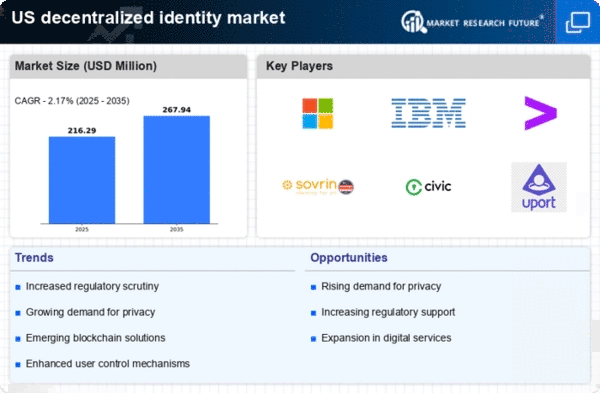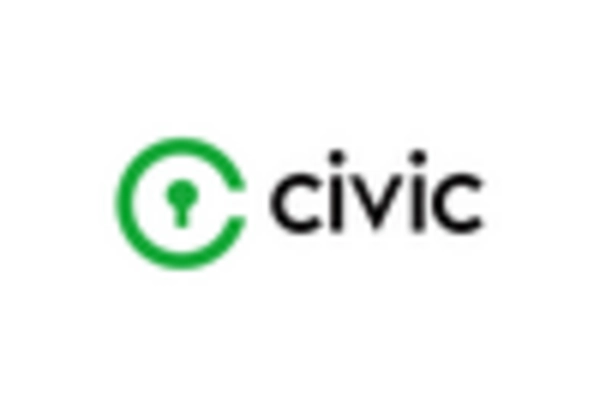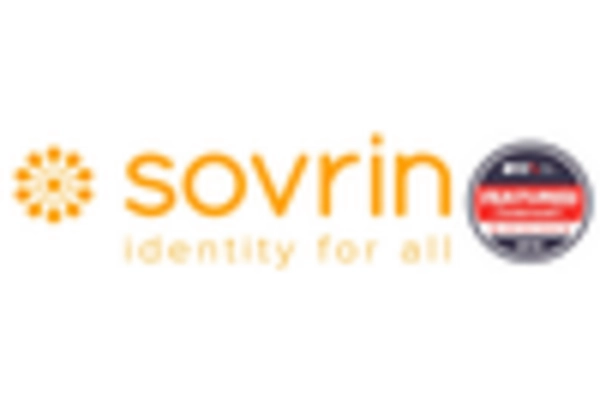Increased Cybersecurity Threats
The rise in cybersecurity threats is a significant driver for the decentralized identity market. As data breaches and identity theft incidents become more prevalent, organizations are compelled to seek more secure identity management solutions. The decentralized identity market is responding to this urgency by providing innovative solutions that mitigate risks associated with centralized identity systems. A report indicates that cybercrime could cost the global economy over $10.5 trillion annually by 2025, underscoring the need for enhanced security measures. Consequently, businesses are increasingly investing in decentralized identity solutions to protect sensitive information and maintain customer trust, thereby propelling market growth.
Technological Advancements in Blockchain
Technological advancements in blockchain are playing a pivotal role in shaping the decentralized identity market. The integration of blockchain technology enhances the security and transparency of identity verification processes, making it increasingly attractive for various sectors, including finance, healthcare, and government. As organizations adopt blockchain-based solutions, the decentralized identity market is likely to witness accelerated growth. Reports suggest that the blockchain technology market is expected to grow to $67.4 billion by 2026, which could further bolster the decentralized identity market. This synergy between blockchain and identity solutions may lead to more robust and user-centric identity management systems, thereby transforming how identities are verified and managed.
Consumer Awareness and Demand for Control
Consumer awareness regarding data privacy and the desire for greater control over personal information are driving forces in the decentralized identity market. As individuals become more informed about their digital footprints, they are increasingly seeking solutions that allow them to manage their identities securely. This shift in consumer behavior is prompting businesses to adopt decentralized identity solutions that empower users with control over their data. The decentralized identity market is thus witnessing a transformation, as companies strive to meet the expectations of privacy-conscious consumers. This trend is likely to continue, with projections indicating that the market could grow by over 20% annually as more individuals demand secure and user-centric identity management options.
Rising Demand for Digital Identity Solutions
The decentralized identity market is experiencing a notable surge in demand for digital identity solutions, driven by the increasing reliance on online services. As businesses and consumers seek more secure and efficient ways to verify identities, the market is projected to grow significantly. According to recent estimates, the market could reach a valuation of approximately $30 billion by 2026, reflecting a compound annual growth rate (CAGR) of around 25%. This growth is indicative of a broader trend where organizations are prioritizing digital identity management to enhance user experience while ensuring security. The decentralized identity market is thus positioned to capitalize on this demand, offering innovative solutions that address the challenges of traditional identity verification methods.
Regulatory Developments and Compliance Requirements
Regulatory developments are significantly influencing the decentralized identity market. As governments and regulatory bodies establish stricter compliance requirements for data protection and identity verification, organizations are compelled to adapt their identity management practices. The decentralized identity market is poised to benefit from these regulatory changes, as businesses seek solutions that not only comply with regulations but also enhance security and user trust. Recent legislation, such as the California Consumer Privacy Act (CCPA), has set a precedent for data privacy standards, prompting organizations to invest in decentralized identity solutions. This regulatory landscape is expected to drive market growth, with estimates suggesting a potential increase in market size by 15% over the next few years.
















